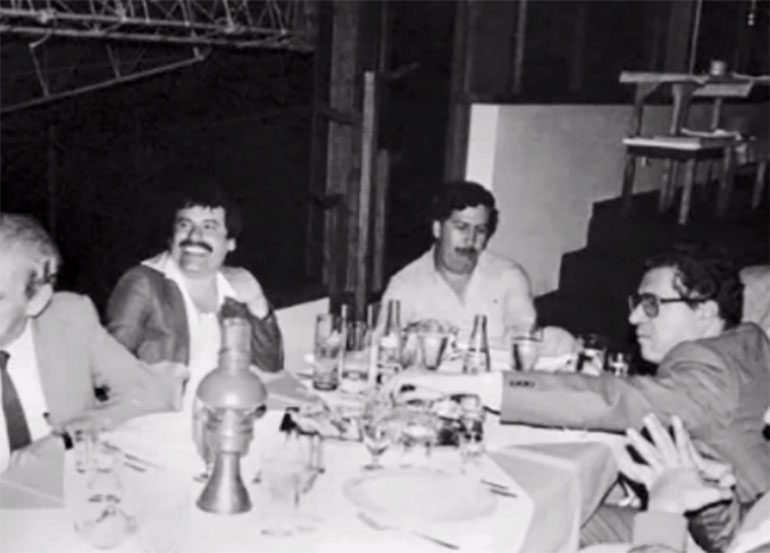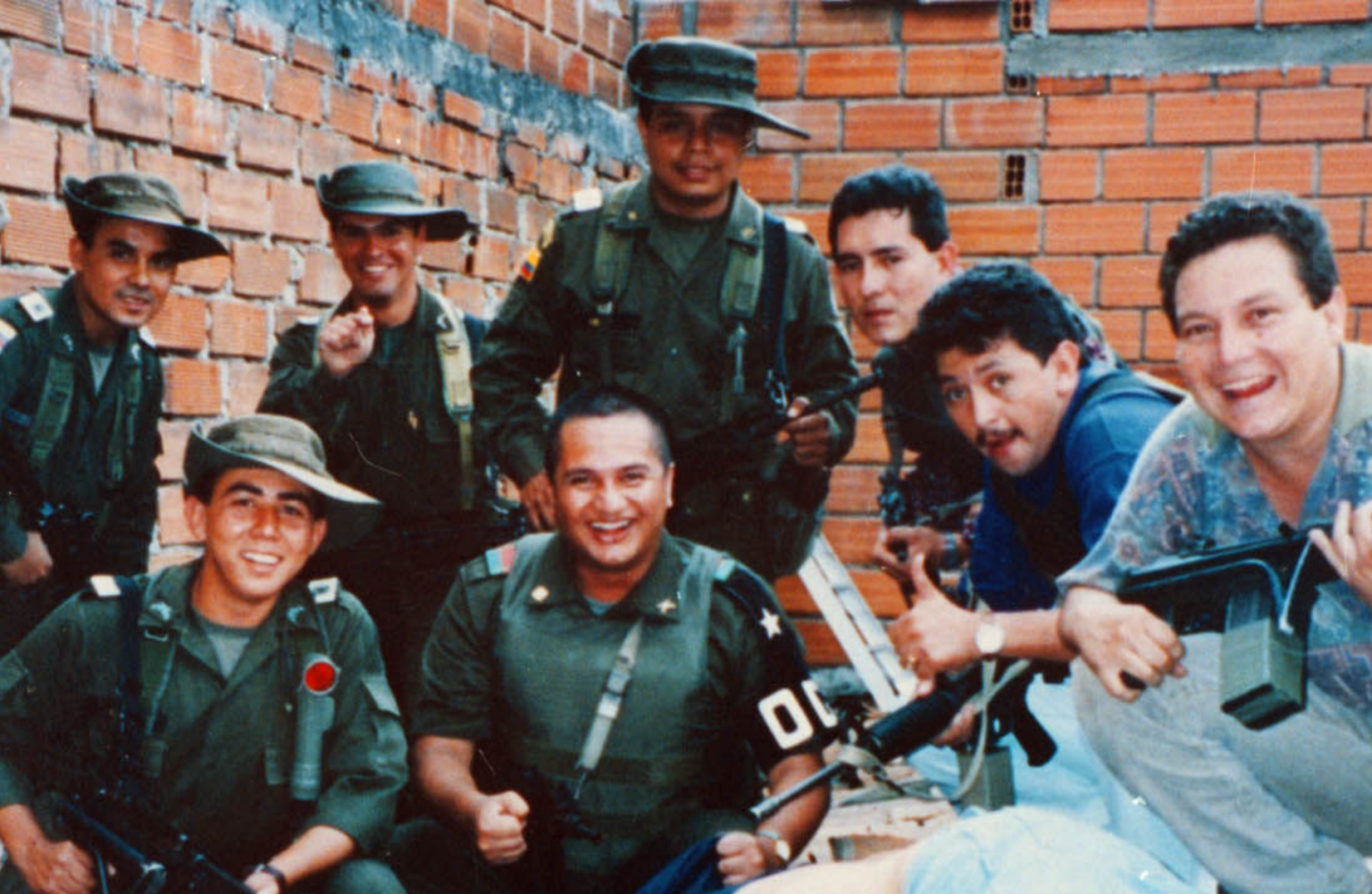Gallardo & Escobar: Did They Meet? The Truth Revealed!
Did two of the most infamous drug lords of the late 20th century ever actually meet? The question of whether Flix Gallardo and Pablo Escobar ever crossed paths in real life remains one of the most tantalizing mysteries in the annals of narco-history. While popular culture, particularly the Netflix series "Narcos: Mexico," has fueled the speculation with dramatized encounters, the truth is far more complex and shrouded in uncertainty.
For decades, the possibility of a face-to-face meeting between Miguel ngel Flix Gallardo, the "El Padrino" of the Guadalajara Cartel, and Pablo Escobar, the head of the Medelln Cartel, has captivated the public imagination. Both men, in their respective domains, reshaped the global drug trade, leaving behind legacies of both immense wealth and unparalleled violence. But did their ambition and influence ever bring them together in a clandestine rendezvous?
| Information | |
|---|---|
| Name | Miguel ngel Flix Gallardo |
| Nickname | El Padrino (The Godfather) |
| Born | January 8, 1946 (age 78 years) |
| Origin | Culiacn, Sinaloa, Mexico |
| Nationality | Mexican |
| Occupation | Drug Lord (Former Police Officer) |
| Years active | 1970s 1989 |
| Organization | Guadalajara Cartel |
| Criminal charge | Drug trafficking, murder |
| Penalty | 40 years imprisonment |
| Spouse(s) | Mara Elvira Murillo (m. ??) |
| Children | 9 |
| Parents | Paula Gallardo, Miguel Flix Urrea |
| Reference | britannica.com |
Accounts vary wildly. Some claim a meeting took place in 1980 in Panama, where they forged a business relationship, agreeing to collaborate on drug trafficking operations. Others pinpoint 1984 as the year of a momentous encounter that forever altered the course of the global drug market. These accounts depict a gathering of titans, where the two most powerful drug lords in the world laid the foundation for a future of cooperation and shared profits. However, such narratives clash with the prevailing consensus among experts and historians, who largely dismiss the idea of a direct meeting.
The Netflix series "Narcos: Mexico" famously portrays such a crossover, depicting Gallardo and Escobar meeting in Colombia. However, many believe this dramatic depiction was primarily intended to bring back actor Wagner Moura, who played Escobar in the earlier "Narcos" series. From a historical perspective, the likelihood of this meeting is considered extremely low. The series, while entertaining, takes significant liberties with the facts for dramatic effect.
| Information | |
|---|---|
| Name | Pablo Emilio Escobar Gaviria |
| Nickname | El Patrn (The Boss) |
| Born | December 1, 1949 |
| Died | December 2, 1993 (aged 44) Medelln, Colombia |
| Origin | Rionegro, Antioquia, Colombia |
| Nationality | Colombian |
| Occupation | Drug Lord, Politician |
| Years active | 1970s 1993 |
| Organization | Medelln Cartel |
| Criminal charge | Drug trafficking, murder, terrorism |
| Spouse(s) | Mara Victoria Henao Vallejo (m. 1976) |
| Children | 2 |
| Parents | Abel de Jess Escobar Echeverri,Hermilda Gaviria Berro |
| Reference | britannica.com |
The main argument against a direct meeting lies in the fact that Gallardo and Escobar, while operating within the same overarching industry, occupied distinct geographical territories and spheres of influence. Gallardo, as the head of the Guadalajara Cartel, primarily controlled drug trafficking routes through Mexico, facilitating the movement of cocaine from South America to the United States. Escobar, on the other hand, was the undisputed king of the Medelln Cartel, directly overseeing cocaine production and distribution from Colombia.
Their operational differences further support the argument against a face-to-face meeting. Gallardo's strategy relied on building a network of alliances with other cartels, consolidating power through partnerships and strategic collaborations. Escobar, while also engaging in partnerships, was known for his more aggressive and often ruthless approach to maintaining control. This difference in management styles might have made a direct, trust-based collaboration, requiring a personal meeting, less appealing for both parties.
- Hdhub4u 2025 Is It Safe Your Guide Legal Streaming Options
- Vegamovies Your Guide To Streaming Bollywood Hindi Dubbed Movies
However, this does not entirely negate the possibility of indirect connections or intermediaries. It's plausible that their organizations communicated through trusted representatives, facilitating the flow of drugs and money without the need for a personal encounter. One name that frequently surfaces in this context is Juan Matta-Ballesteros, a Honduran drug trafficker who acted as a key link between the Medelln Cartel and Mexican cartels, including Gallardo's organization. Matta-Ballesteros may have served as the crucial intermediary, ensuring smooth business operations between the two cartels without necessitating a direct summit between their leaders.
It's also important to note the political climate of the time. In the late 1980s, Escobar was increasingly focused on his war against the Colombian government and rival cartels, particularly the Cali Cartel. This internal conflict consumed much of his attention and resources, potentially limiting his ability or willingness to engage in complex negotiations with foreign counterparts. Similarly, Gallardo's empire in Mexico was facing increasing pressure from law enforcement, culminating in his arrest in 1989. These internal pressures might have further reduced the likelihood of a meeting between the two drug lords.
Guillermo Calderoni, the Mexican law enforcement officer who arrested Flix Gallardo, provided valuable insights into the changing political landscape that led to Gallardo's downfall. In an online interview, Calderoni suggested that increased cooperation between the United States and Mexico, driven by the North American Free Trade Agreement (NAFTA) and the "war on drugs," played a significant role in the decision to pursue Gallardo. This external pressure further complicates the narrative, suggesting that Gallardo's priorities were focused on survival rather than expanding his operations through new partnerships.
Despite the lack of definitive evidence, the enduring fascination with Flix Gallardo and Pablo Escobar continues to fuel speculation about their potential connection. Both men were pivotal figures in the history of drug trafficking, shaping the landscape of narcotics in the 1980s and 1990s. Their actions had profound consequences, not only for their respective countries but for the world as a whole. The allure of a possible meeting between these two titans stems from the desire to understand the inner workings of a complex and shadowy world, where power, ambition, and violence intertwine.
Even without a personal meeting, the legacies of Gallardo and Escobar remain intertwined. Gallardo's consolidation of the Mexican drug trade laid the groundwork for the powerful cartels that exist today. His ability to forge alliances and control trafficking routes transformed Mexico into a major player in the global drug market. Escobar's influence, on the other hand, was felt through his innovative drug production and distribution methods, as well as his brutal tactics for maintaining control. Together, they represent two distinct approaches to drug trafficking, each leaving an indelible mark on the world.
In the end, the question of whether Flix Gallardo and Pablo Escobar ever met in person may never be definitively answered. The available evidence suggests that a direct meeting is unlikely, but the possibility of indirect connections and intermediaries remains open. What is certain is that both men were instrumental in shaping the global drug trade, and their stories continue to fascinate and intrigue us today.
The portrayal of Flix Gallardo's "business trip" to Colombia and Nicaragua, where he supposedly met with Escobar and members of the Cali Cartel, is a dramatized version of events for entertainment purposes. While Gallardo undoubtedly engaged in business dealings with Colombian cartels, the likelihood of a face-to-face meeting with Escobar is questionable.
It is more probable that Flix Gallardo conducted business primarily with Juan Matta-Ballesteros, who served as the intermediary between the Medelln Cartel and the Mexican cartels. This indirect communication would have allowed for the flow of drugs and money without requiring a direct meeting between the two leaders.
Pablo Escobar's focus in the late 1980s was primarily on his war against the Colombian government and the Cali Cartel. This internal conflict consumed much of his attention and resources, making it less likely that he would have engaged in extensive negotiations with foreign counterparts.
The fact that Flix Gallardo and Pablo Escobar operated in different countries and during slightly different time periods further diminishes the likelihood of a meeting. Gallardo was primarily active in the late 1970s and 1980s, while Escobar's influence peaked in the 1980s and early 1990s. Their geographical separation and differing timelines would have made it more challenging to coordinate a meeting.
Despite the lack of concrete evidence, the speculation about a potential meeting between Flix Gallardo and Pablo Escobar persists due to the enduring fascination with these two infamous figures. Both men represent the epitome of power, wealth, and violence in the world of drug trafficking. The allure of a possible connection stems from the desire to understand the complexities of their empires and the potential impact of their combined influence.
In conclusion, while the question of whether Flix Gallardo and Pablo Escobar ever met in person remains a topic of debate, the available evidence suggests that it is unlikely. Their geographical separation, differing operational styles, and the presence of intermediaries like Juan Matta-Ballesteros all point towards an indirect relationship rather than a direct encounter. Nevertheless, their legacies as two of the most notorious drug lords in history remain intertwined, shaping the landscape of the global drug trade for decades to come.
The idea that "Mexico" depicts gallardo and escobar meeting in colombia is largely fictionalized. Experts generally agree that the two drug lords never actually met.
The inclusion of Wagner Moura in "Mexico" as Pablo Escobar was likely a creative decision to boost viewership rather than a historically accurate portrayal.
The notion that Flix Gallardo and Pablo Escobar met in 1984, marking the first time the two most powerful drug lords in the world had met in person, is not supported by credible evidence.
While it's impossible to say for sure, the evidence suggests that Flix Gallardo and Pablo Escobar's paths likely crossed indirectly through intermediaries.
Both Flix Gallardo and Pablo Escobar significantly impacted the global drug trade, and their legacies continue to influence the underworld.
Flix Gallardo's partnership with other cartels undoubtedly strengthened his business, regardless of whether he met Pablo Escobar.
Flix Gallardo did business mainly with Matta Ballesteros, who acted as an intermediary between the Medelln organization and the Mexican cartels.
It was likely Gacha, another Colombian drug trafficker, who met with representatives from the Mexican cartels in Mexico, not Pablo Escobar himself.
In the late 1980s, Pablo Escobar was primarily focused on his war with the government and the Cali Cartel, further reducing the likelihood of a meeting with Flix Gallardo.
The question of whether Flix Gallardo and Pablo Escobar ever met in person has been a subject of speculation for years, fueled by popular culture and incomplete information.
Some sources claim that the two drug lords had meetings to discuss their mutual interests in the drug trade, but these claims are largely unsubstantiated.
Flix Gallardo headed the Guadalajara Cartel, while Pablo Escobar led the Medelln Cartel. Their operations were geographically distinct, making a personal meeting less likely.
The enduring fascination with Flix Gallardo and Pablo Escobar, coupled with the complex history of the drug trade, will undoubtedly keep the question of a potential meeting alive.
While it's not definitively known if the two men actually met in real life, they operated around the same time in the 1980s, suggesting a potential for some level of interaction, however indirect.
Various accounts suggest that Flix Gallardo and Pablo Escobar's paths may have crossed indirectly, even if they never met in person.
The names Flix Gallardo and Pablo Escobar evoke images of immense power, wealth, and brutal violence. Their empires operated largely in separate spheres, but their impact on the drug trade was undeniable.
Many people continue to ponder the central question: Did Flix Gallardo meet Pablo Escobar in real life? The details remain murky, but their influence is clear.
This article delves into their potential connection, shedding light on their lives and the possibility of encounters between them, however improbable they may be.
The depiction of Flix meeting Pablo Escobar in Colombia is a dramatization. In reality, "We did not meet on the street," as one might expect in a work of fiction.
As the cocaine czar for having opened the coca routes from south america to the united states and dealings with pablo escobar."
- Pinayflix Tv Your Ultimate Guide To Filipino Entertainment
- Subhashree Sahu Video The Privacy Debate What Happened

Miguel Ángel Felix Gallardo and Pablo Escobar in real life narcos

Unraveling The Connection Did Felix Gallardo Meet Pablo Escobar In

Did Notorious Drug Lords Felix Gallardo And Pablo Escobar Ever Cross Paths?